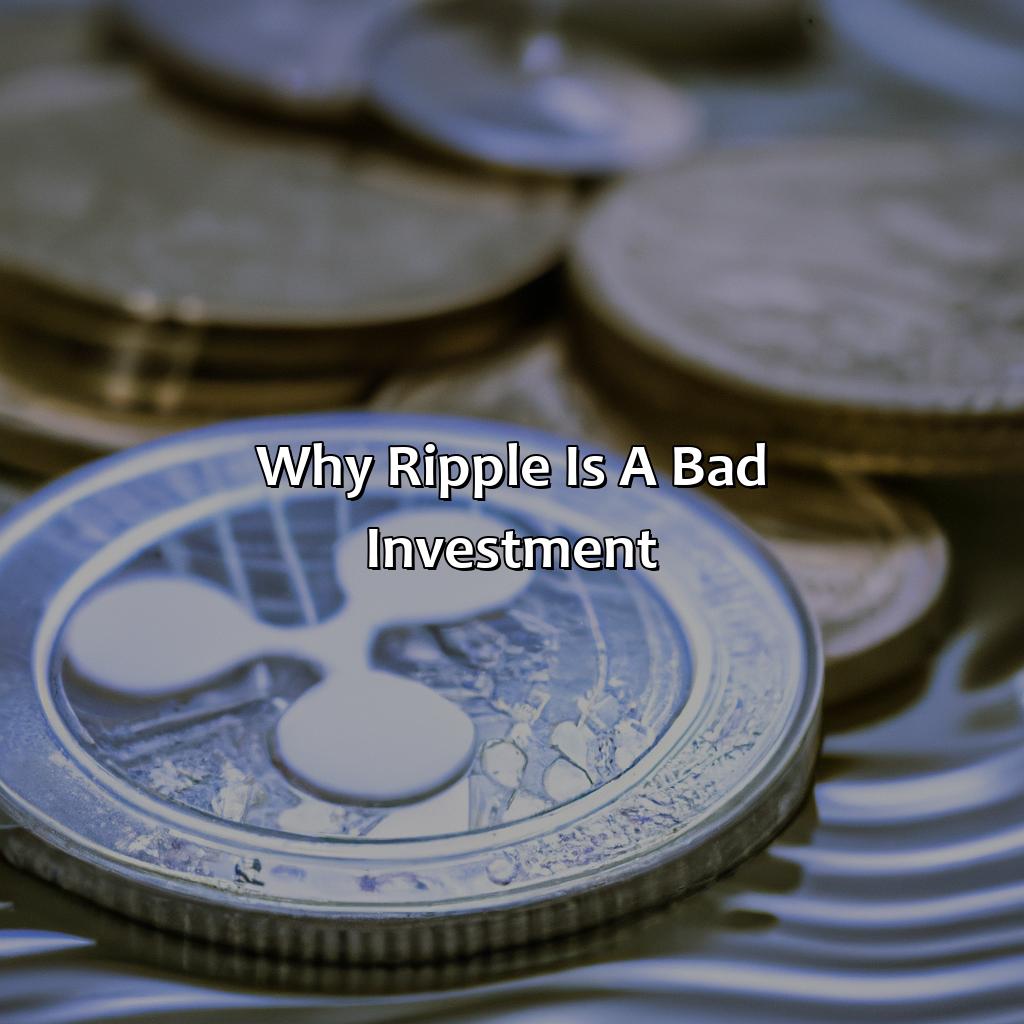Why Ripple Is A Bad Investment?
Key Takeaway:
- Investing in Ripple can be risky due to the volatility of cryptocurrency prices. There is no guarantee that the value of Ripple will increase over time, and investors could potentially lose their investment.
- Ripple is criticized for its centralization and control over its blockchain. This goes against the decentralized and open nature of most cryptocurrencies, and some investors may be wary of investing in a platform that operates in this manner.
- Ripple is facing legal issues and criticisms over its classification as a security. This uncertainty surrounding Ripple’s regulatory status could impact its value and make it a risky investment.
Struggling to decide whether to invest in Ripple? You’re not alone. With its volatile and uncertain market, there are a number of valid concerns you should consider before taking the plunge. Keep reading to discover why Ripple might not be the best investment for you.
What is Ripple?
Ripple is a digital currency that functions as both a payment network and a cryptocurrency. It was founded in 2012 by Chris Larsen and Jed McCaleb with the goal of creating an efficient system for cross-border payments. Ripple’s technology enables banks and financial institutions to send and receive payments in real-time, without the need for intermediaries. Its native token, XRP, is used as a bridge currency to facilitate transactions between different fiat currencies.
Ripple’s unique selling proposition is its ability to settle transactions quickly and cheaply, making cross-border payments faster and more accessible. Its technology has garnered interest from traditional financial institutions, with many partnering with Ripple to explore its potential. Ripple has also been touted as a potential replacement for Swift, the current system used by banks for cross-border transfers.
However, Ripple’s centralized nature and control over a significant portion of XRP tokens has raised concerns among critics about its long-term viability as a truly decentralized currency.
Interestingly, Ripple’s co-founder Jed McCaleb left the company in 2013 to create another cryptocurrency called Stellar, which aims to provide financial services to the unbanked population. This move also highlights the potential competition within the cryptocurrency space.
According to a report by Forbes in 2019, Ripple’s adoption rate by financial institutions has been slower than anticipated, with only a few banks actively using the technology. This raises questions about the scalability and sustainability of Ripple’s model as adoption is key to any successful cryptocurrency.
Research by CoinMarketCap in 2019 has shown that despite being the third-largest cryptocurrency by market cap, XRP’s daily trading volume is dominated by high-frequency traders and bots, providing a volatile environment for investors.

Image credits: retiregenz.com by Yuval Jones
The Cons of Investing in Ripple
Are you thinking of investing in Ripple? This section will explain why it might not be the best option. It looks at three key points:
- Volatility in Cryptocurrency
- Centralization of Ripple
- Legal Issues with Ripple
All this to give you a better idea of the risks.

Image credits: retiregenz.com by Joel Woodhock
Volatility in Cryptocurrency
The fluctuation in digital currencies is a pertinent issue for investors. Cryptocurrency values are highly unstable and can vary drastically within a short period. The frequent changes in market demand, supply and anti-regulatory shifts by governments increase the unpredictability of cryptocurrencies. These fluctuations cause people to hesitate before investing their money.
It is important to note that volatility is an inherent characteristic of cryptocurrency as it remains unregulated, decentralized, and independent of the economy. For instance, Bitcoin’s value increased from $434 to $19,783 between 2016-2017 but plummeted back to $3,234 in 2018 due to market factors. Similarly, Ripple came into prominence with a rally that continues until new regulations were brought into effect. Investors should be aware of these risks before investing their time and resources.
Despite the volatility of digital currencies, they remain an attractive investment option; however, one needs to tread carefully. While investing in Ripple or any other cryptocurrency, fluctuation needs examination before investment decisions have made—such as investing in smaller amounts than normal or employing strategies like cost averaging while waiting for stability or using stop-loss orders if trading proceeds one way too quickly.
Investors must embrace this volatility while focusing on gaining knowledge about how cryptocurrency markets operate. They must also begin little before committing more significant amounts since the growth chart for each currency varies and depends on many variables beyond their control, causing erratic uncertainty difficult for inexperienced traders to cope with. Smoothening the learning curve with manageable alterations and testing investment strategies ultimately raises the chances of profitable investments.
Ripple’s centralization is like a group project where only one person does all the work, but gets to keep all the credit (and your money).
Centralization of Ripple
Ripple’s centralized structure is the major drawback of investing in it. Its centralization means that the company has much control over the network, which goes against the decentralized nature of cryptocurrencies. This control exposes investors to a greater risk as any security breach, failure or hacking can cause significant damage.
Moreover, Ripple’s XRP token issuance is also controlled by the company and its founders, unlike other cryptocurrency tokens that operate upon consensus-based models. The concentration of control and authority diminishes trust in Ripple among investors and traders.
To make matters worse, Ripple also faces an ongoing lawsuit from the U.S. Securities and Exchange Commission (SEC) regarding challenges about its XRP token being a security.
Investors who are looking to include Ripple as part of their portfolio should examine the financial and legal aspects cautiously before investing. It’s advisable to diversify your portfolio with other cryptocurrencies at this time until there is complete clarity surrounding Ripple’s legal issues.
While investing in Ripple may make your wallet fat, the legal issues surrounding it will make your head spin.
Legal Issues Surrounding Ripple
With Ripple facing numerous challenges, its legality remains questionable. The coin has faced several lawsuits over the years and recently had a lawsuit filed against it by the Securities and Exchange Commission (SEC) alleging that XRP is an unregistered security. The outcome of this case could have serious ramifications for Ripple.
The fact that Ripple is currently in litigation raises significant concerns about the investment potential of this cryptocurrency. Any possible negative outcome could affect Ripple’s market capitalization and reputation, leading to reduced confidence from investors who seek investment opportunities with less regulatory risk.
Despite Ripple’s reliability as a form of cross-border payment, it is essential to keep up with ongoing legal developments surrounding the coin before making any investment decisions.
Investors should exercise caution when investing in Ripple due to its concerning legal battles, which may have lasting implications on its worth. It would be prudent to stay updated on recent developments and seek advice from financial experts before investing in the cryptocurrency.
Ripple’s competition is like a group of turtles challenging a hare-they may be slow, but they’ll eventually catch up.
Ripple’s Competition
In the world of cryptocurrency, Ripple faces significant competition from other cryptocurrencies. The competition includes Bitcoin, Ethereum, and Litecoin, which are all popular and commonly used in various transactions. Ripple’s Competition has developed an extensive user base of people who are loyal to these currencies. However, Ripple has struggled to gain traction in the market, especially among investors seeking long-term returns.
Despite Ripple’s unique features, such as quick and cheap transactions and the potential to transform cross-border payments, it still has several limitations. One significant drawback of Ripple is the centralized control of the currency by the parent company’s Ripple lab. Some investors are wary of investing in a currency that is not entirely decentralized. Additionally, the competition’s market capitalizations are significantly higher than Ripple, which makes it challenging to compete for investors’ attention.
Beyond the limitations, one way Ripple can come out on top is by expanding its functionality and reaching out to a broader audience. The company could try to attract more developers to its platform, implement advanced security measures to assuage investors’ concerns, and roll out more use cases for its technology. Such strategies would increase Ripple’s reach and potentially earn the trust of more investors.

Image credits: retiregenz.com by Adam Duncun
Five Facts About Why Ripple Is a Bad Investment:
Ripple faces high regulatory risk due to its centralized nature and lack of clear legal status. (Source: Decrypt)
Ripple’s XRP token is not necessary for the company’s core business and may become obsolete in the future. (Source: Investopedia)
Ripple has faced multiple lawsuits over the years, including a recent lawsuit from the SEC alleging that XRP is an unregistered security. (Source: CNBC)
Ripple’s partnerships with major banks have not translated into significant adoption of its technology. (Source: Coindesk)
The cryptocurrency market is highly volatile, and investing in Ripple carries significant risk of loss. (Source: Forbes)
FAQs about Why Ripple Is A Bad Investment?
Why is Ripple considered a bad investment?
One of the main reasons why Ripple is considered a bad investment is its centralized nature. Unlike other cryptocurrencies that operate through decentralized networks, Ripple operates through a centralized network managed by its developers. This means that the value and stability of Ripple can be easily influenced or controlled by a small group of people, which makes it risky for investors.
What are the risks of investing in Ripple?
Investing in Ripple comes with several risks, including regulatory risks, market risks, and liquidity risks. Ripple is subject to increased regulatory scrutiny, which means that strict regulations could negatively impact the value of the currency. Additionally, the market for Ripple is still relatively small, which makes it vulnerable to sudden price fluctuations and volatility. Lastly, the liquidity of Ripple is also low, which could make it difficult for investors to sell their holdings
Can Ripple be profitable in the long term?
While it is possible for Ripple to be profitable in the long term, the risks associated with investing in the currency make it an unattractive investment option for many investors. The centralized nature of Ripple makes it less appealing for those seeking a decentralized investment option, while the regulatory risks and market fluctuations make it risky for investors seeking long-term profits.
What are the alternatives to Ripple?
There are several alternative cryptocurrencies that offer more attractive investment options than Ripple. Ethereum, for example, is a decentralized platform that allows developers to build and deploy decentralized applications using smart contracts. Litecoin is another popular cryptocurrency that offers faster transaction speeds and lower transaction fees than Bitcoin or Ripple. Other alternatives worth considering include Bitcoin Cash, Stellar, and Dash.
How do I avoid investment risks when investing in cryptocurrencies?
Investing in cryptocurrencies can be risky, but there are ways to minimize your risks. Firstly, it is important to research the currency thoroughly and understand its underlying technology and market trends. Additionally, diversifying your investment portfolio can help spread your risk across multiple assets and reduce your exposure to any one asset. Finally, setting a clear investment strategy and sticking to it can help reduce the impact of short-term market fluctuations.
Is Ripple a safe investment option for beginners?
Ripple is not considered a safe investment option for beginners due to its relatively high risk profile. The currency is subject to high volatility, regulatory risks, and low liquidity, which makes it a tough investment option for novice investors. It is crucial that investors fully understand the risks associated with Ripple and are prepared to handle them before investing in the currency.
 Checkout this IRS Loophole
Checkout this IRS Loophole 
